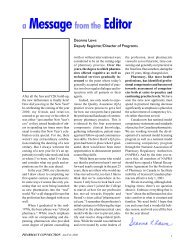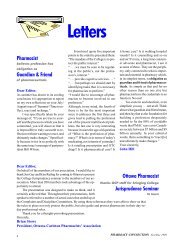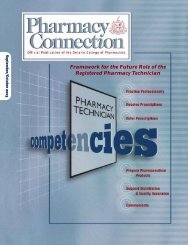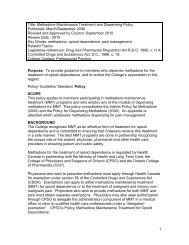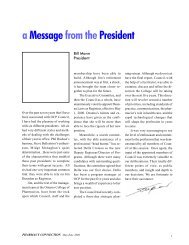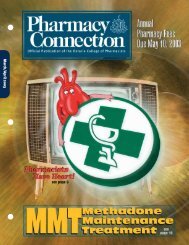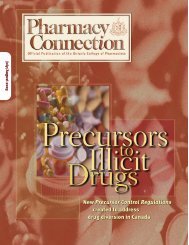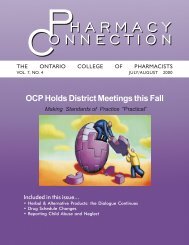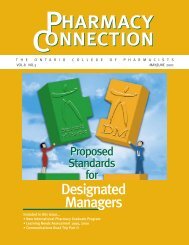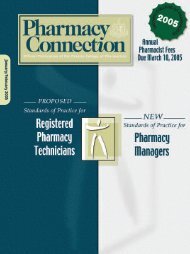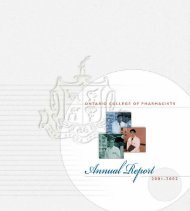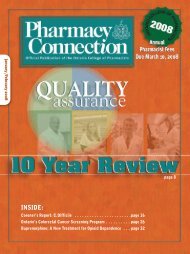Pdf File - Ontario College of Pharmacists
Pdf File - Ontario College of Pharmacists
Pdf File - Ontario College of Pharmacists
Create successful ePaper yourself
Turn your PDF publications into a flip-book with our unique Google optimized e-Paper software.
INSPECTORS’ CORNER<br />
INSPECTORS’ CORNER<br />
Brian Hack, Investigator<br />
Elaine Maloney, Practice Advisory Officer<br />
Protecting our environment is<br />
important to all <strong>of</strong> us. There are<br />
also ever increasing headlines<br />
about protecting the wetlands, wildlife<br />
sanctuaries and other natural resources<br />
in <strong>Ontario</strong>. Indeed the responsibility <strong>of</strong><br />
protecting our environment is<br />
everyone’s responsibility.<br />
<strong>Pharmacists</strong> need to be aware <strong>of</strong><br />
their responsibilities and the Standards<br />
<strong>of</strong> Practice regarding the safe disposal<br />
<strong>of</strong> medications and raise awareness and<br />
educate the public on the dangers <strong>of</strong><br />
improper or unsafe disposal practices.<br />
<strong>College</strong> staff have been meeting<br />
with the Ministry <strong>of</strong> the Environment<br />
to clarify the intent <strong>of</strong> the legislation<br />
and assist pharmacists in promoting<br />
safe disposal methods. The following<br />
Questions and Answers have been<br />
developed to clarify the expectations <strong>of</strong><br />
the <strong>College</strong> and the Ministry <strong>of</strong> the<br />
Environment.<br />
Are there drugs that the Ministry<br />
<strong>of</strong> Environment has identified as<br />
hazardous and requiring special<br />
consideration?<br />
Pharmacies sell many chemicals and<br />
dispense many drugs that are considered<br />
hazardous or toxic if disposed <strong>of</strong><br />
improperly. Certain pharmaceuticals<br />
contain active ingredients that are classified<br />
under Regulation 347,<br />
Schedules 2(A) & (B), as hazardous<br />
waste.<br />
Some <strong>of</strong> the more common products<br />
(active ingredients) are:<br />
• Warfarin<br />
• Epinephrine<br />
• Nicotine<br />
• Nitroglycerin<br />
• Chlorambucil<br />
• Cyclophosphamide<br />
• Melphalan<br />
In previous Pharmacy Connections<br />
the <strong>College</strong> recommended that expired<br />
or returned medications be destroyed<br />
in an environmentally friendly method.<br />
As well, the Standards <strong>of</strong> Practice,<br />
Operational Component 5.6 refers to<br />
“disposal <strong>of</strong> those drugs according to<br />
environmental regulations under<br />
written policies and procedures.”<br />
Can you explain what is meant<br />
by “environmentally friendly”<br />
and “according to environmental<br />
regulations”?<br />
Protecting the environment is the<br />
responsibility <strong>of</strong> every person and<br />
organization. <strong>Pharmacists</strong> need to be<br />
aware <strong>of</strong> the effects that pharmaceuticals<br />
may have on the environment and<br />
should ensure that all pharmaceuticals<br />
are disposed <strong>of</strong> according to the principals<br />
<strong>of</strong> preferred management.<br />
The Ministry’s preferred management<br />
options for pharmaceutical waste are:<br />
• Management <strong>of</strong> pharmaceutical<br />
wastes outside <strong>of</strong> the municipal sanitary<br />
sewer system i.e., do not flush<br />
medications down the drain or toilet<br />
• Off-site management <strong>of</strong> waste pharmaceuticals<br />
by a commercial waste<br />
management company. Programs are<br />
available for pharmacies that operate<br />
a public waste (take-back) program<br />
• Management outside <strong>of</strong> nonhazardous<br />
landfills i.e., medications<br />
should not be disposed <strong>of</strong> in regular<br />
municipal garbage<br />
How can I find out about<br />
programs for drug disposal?<br />
You can contact the <strong>Ontario</strong> <strong>Pharmacists</strong>’<br />
Association at 416-441-0788 to<br />
enquire about their pharmaceutical<br />
waste disposal and medicine cabinet<br />
cleanup programs. In addition, some<br />
communities and local pharmacist associations<br />
have developed ongoing<br />
medicine cabinet cleanup programs.<br />
I accept unused or expired<br />
medication at my pharmacy from<br />
my patients. Do I still need to<br />
register with the Ministry the fact<br />
that our pharmacy generates<br />
hazardous waste?<br />
Pharmacies that operate public waste<br />
programs are not required to register<br />
these wastes with the Ministry —<br />
provided they have a signed agreement<br />
with an approved biomedical waste<br />
management company. Each <strong>of</strong> these<br />
companies has an exemption in their<br />
Certificate <strong>of</strong> Approval that permits the<br />
pharmacy to dispose public drug waste<br />
without having to manifest or register<br />
these wastes with the Ministry.<br />
There are two biomedical waste<br />
management companies in <strong>Ontario</strong><br />
that are approved to manage public<br />
waste without requiring the pharmacy<br />
to register with the Ministry:<br />
1. Medical Waste Management Inc.:<br />
1-866-836-6660<br />
2. Stericycle Inc.: 1-877-791-3545<br />
Pharmacy Connection March • April 2004 23



